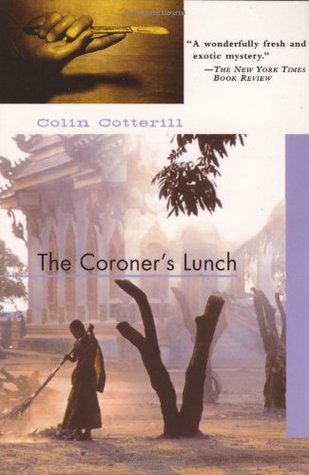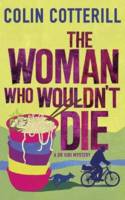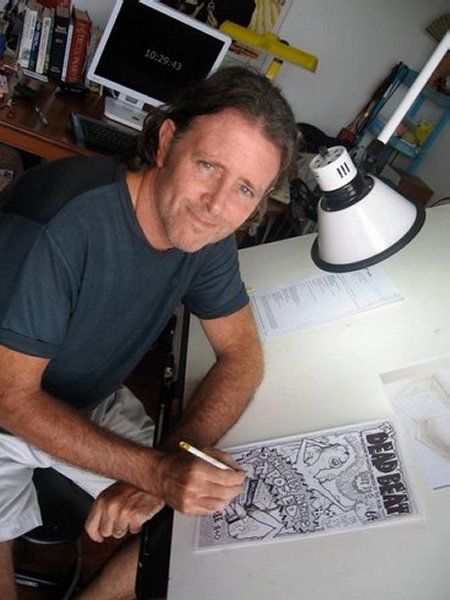Crime Novelist Cotterill Is Still A Mystery In Vientiane
The adventures of coroner-sleuth Dr Siri have attracted an army of readers in the West, but he remains a stranger back home
Colin Cotterill is without doubt the best-known author of murder mysteries set in Laos, a communist country where crimes are rarely even reported in the state-run press.
In fact, Cotterill, 61, may well be the only author of murder mysteries with Laos as their setting.
The protagonist of the British author’s award-winning series is Dr Siri Paiboun, fictionally appointed the first and only coroner in Vientiane in 1978 during the largely unchronicled period soon after the land-locked country became communist in December 1975.
 Siri, through his chance encounters with mysteriously slain cadavers at the city morgue, is dragged into sleuthing with the assistance of nurse Dtui, constantly seeking a scholarship to further her studies in East Germany, and the corpse-handler Geung, who is mildly affected by Down’s syndrome.
Siri, through his chance encounters with mysteriously slain cadavers at the city morgue, is dragged into sleuthing with the assistance of nurse Dtui, constantly seeking a scholarship to further her studies in East Germany, and the corpse-handler Geung, who is mildly affected by Down’s syndrome.
Although a card-carrying communist for 47 years, Siri, 72, has long lost his faith in Marxism, or certainly the Lao version of it.
His sarcastic handling of senior cadres and the communist bureaucracy in the course of solving murders is part of the appeal of the nine-book series, which won Cotterill the Crime Writers’ Association’s Dagger in the Library award in 2009 and the Dillys Award in 2006.
His Siri series has been translated into German, French and Thai.
To date it is unavailable in Lao.
“Our big problem at the moment is trying to get the books translated into Lao,” says Cotterill, who lives in a beachfront house on the shore of the Gulf of Thailand in Chumphon province. “This is a big challenge.”
 The author, who lived in Laos between 1990 and 1994, working for Unesco, based most of his rendering of communist Laos in 1978 on interviews with Lao people who had lived through the period, somehow avoiding the temptation to swim across the Mekong River to “democratic” Thailand.
The author, who lived in Laos between 1990 and 1994, working for Unesco, based most of his rendering of communist Laos in 1978 on interviews with Lao people who had lived through the period, somehow avoiding the temptation to swim across the Mekong River to “democratic” Thailand.
“One of my dreams is to stand in front of a group of Lao university students and suffer questions from an intelligent forum about my misinterpretations of Lao history, but in Lao,” says Cotterill, a fluent Lao speaker. “That would be the ultimate challenge for me.”
Despite stiff censorship, the Siri series is available in Laos in English, published by Lao Insight Books, which distributes them at the Wattay International Airport of Vientiane and the Lao Insight bookstore.
Sadly, few Lao people read English.
“The failure to produce a Lao translation so far has been a matter of human failure rather than political restriction,” says Robert Cooper, director of Lao Insight Books.
Several translators have tackled the job, but failed to deliver. Whether censors would approve a Lao translation, if it ever materialises, is doubtful.
Cooper has tested the local reaction to the Siri series with a handful of Lao students capable of reading the first two books – “The Coroner’s Lunch” and “Thirty Three Teeth” – in Thai, which is similar to Lao.
“The humour is seen and appreciated,” Cooper says of the test run.
“The sarcasm aspect in the humour was however interpreted as criticism. Generally, nobody thought the criticism unjustified, but when asked if they thought anything could be better done, all would have preferred there to be less ‘criticism’ or ‘politics’.”
Laos, although generally perceived by foreign tourists as a land of happy, laid-back denizens, it is in fact a totalitarian state ruled by one party, the communist one, which brooks no criticism or dissent.
The last public protest was in 2001, and some of the participants in that incident are still missing.
The country’s best-known social activist, Sombath Somphone, was detained at a police checkpoint on December 15, 2012, whisked away in a vehicle and has not been seen again since.
“I think a real Dr Siri would be locked away by now,” Cotterill says of his main character. “Dr Siri is too vocal.”
Meanwhile, Cotterill has provided a glimpse of communist Laos, warts and all, that was unavailable to most readers before his series commenced publication in 2004 at the New York-based Soho Press Inc.
The books sell better in Germany than in Britain.
“Nobody likes my stuff in England,” Cotterill says.
“I don’t know why. They go for the covers of Alexander McCall Smith instead,” he said, referring to the British author of the No 1 Ladies’ Detective Agency series based in Botswana, Africa. McCall Smith’s mysteries are in a similar genre, with an African woman protagonist. “If it wasn’t for Germany I would probably be selling papaya out in the streets,” Cotterill says.
He attributes his popularity in Germany to a better publicity campaign, including a big spread in Brigitte magazine which introduced him to 20 million female readers.
Another shot at fame for Cotterill could be Dr Siri, the movie.
“I can see Jackie Chan doing a good Dr Siri, but only as a feature film,” Cotterill says. “But it would never be seen in Laos.”
Source: The Nation

